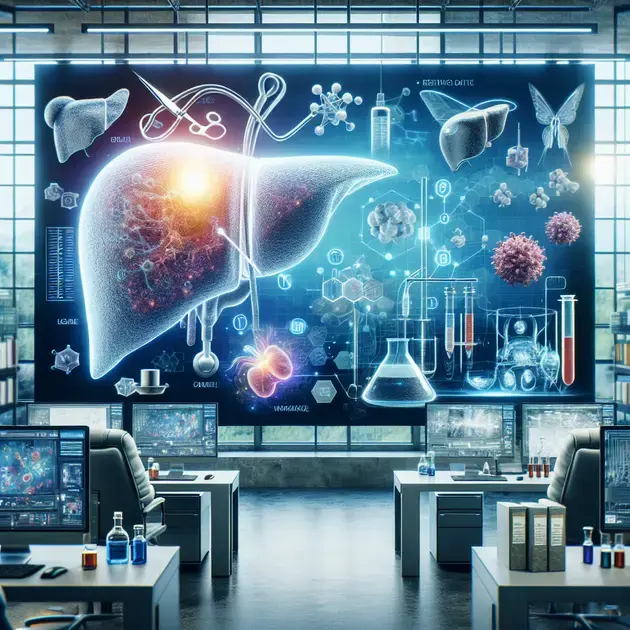Unlocking the Secrets of Liver Cancer is a crucial step towards understanding and combatting this deadly disease that affects millions of people worldwide. With advancements in medical research and technology, scientists are constantly uncovering new insights into the complexities of liver cancer.
Recent studies have revealed that liver cancer is often linked to underlying conditions such as chronic liver disease, hepatitis B or C, and excessive alcohol consumption. By delving deeper into these connections, researchers are gaining a better understanding of the risk factors and potential treatment options for patients affected by this aggressive form of cancer.
Understanding Liver Cancer Risk Factors
Liver cancer is a condition with various risk factors that can increase the likelihood of developing the disease. Understanding these risk factors is crucial for prevention and early detection. Some common risk factors for liver cancer include:
- Chronic infection with hepatitis B or C viruses
- Cirrhosis of the liver
- Excessive alcohol consumption
- Non-alcoholic fatty liver disease
One way to assess your risk for liver cancer is by consulting with a healthcare provider and undergoing relevant screenings. The American Cancer Society website provides comprehensive information on liver cancer risk factors and screening guidelines.
Research Breakthroughs in Liver Cancer
Ongoing research in the field of liver cancer has led to significant breakthroughs in diagnosis and treatment. Scientists and medical professionals are constantly exploring new technologies and therapies to improve outcomes for patients with liver cancer. Some recent research breakthroughs in liver cancer include:
- Advancements in imaging techniques for early detection
- Targeted therapies that attack specific cancer cells
- Immunotherapy options that boost the body’s immune response
Websites like the National Cancer Institute provide updates on the latest research findings in liver cancer. Staying informed about these breakthroughs can help patients and caregivers make more educated decisions about treatment options.
Exploring Treatment Options for Liver Cancer
When it comes to treating liver cancer, patients have a range of options available depending on the stage and severity of the disease. Some common treatment modalities for liver cancer include:
- Surgery to remove tumors or part of the liver
- Chemotherapy or radiation therapy to target cancer cells
- Radiofrequency ablation or cryoablation to destroy tumors
Online resources such as the Mayo Clinic website offer detailed information on different treatment options for liver cancer. Consulting with a healthcare team specialized in liver cancer can help individuals explore the most suitable treatment plan for their specific condition.
Common Symptoms of Liver Cancer
Liver cancer is a serious condition that can manifest itself in various symptoms. One common symptom is unexplained weight loss, which occurs as the cancer progresses and affects the body’s ability to function properly. Another symptom is abdominal pain or swelling, which can be caused by the tumor pressing on nearby organs or affecting the liver’s blood flow.
Patients with liver cancer may also experience fatigue and weakness, as the disease can impact the body’s energy levels and overall well-being. Jaundice, a condition that causes yellowing of the skin and eyes, is another common symptom of liver cancer, as it indicates a problem with the liver’s ability to process bilirubin.
In some cases, liver cancer can lead to nausea and vomiting, as the tumor can interfere with digestion and cause discomfort. Additionally, individuals with liver cancer may notice changes in their appetite and overall digestive health, which can be attributed to the impact of the disease on the liver and surrounding organs.
Early detection and treatment of liver cancer are crucial in managing these symptoms and improving the patient’s quality of life. It’s important for individuals to be aware of the potential signs of liver cancer and seek medical attention promptly if any of these symptoms arise.
Nutrition and Lifestyle Tips for Liver Cancer Patients
Managing nutrition and lifestyle can play a significant role in supporting liver cancer patients throughout their treatment journey. It’s essential for patients to focus on maintaining a balanced diet that includes plenty of fruits, vegetables, lean proteins, and whole grains to support their overall health and well-being.
Staying hydrated is also important for liver cancer patients, as it can help support liver function and prevent complications. Avoiding alcohol and tobacco is crucial, as these substances can exacerbate the effects of liver cancer and hinder the body’s ability to heal.
Incorporating regular physical activity into daily routines can also benefit liver cancer patients, as it can help improve energy levels, reduce stress, and support overall physical and mental health. Seeking support from healthcare providers, nutritionists, and mental health professionals can also be beneficial in addressing the unique needs of liver cancer patients.
By focusing on nutrition, hydration, physical activity, and emotional support, liver cancer patients can optimize their overall health and well-being during treatment and beyond.
Support Strategies for Family Members of Liver Cancer Patients
Supporting a loved one with liver cancer can be emotionally challenging, but there are strategies that family members can implement to provide meaningful support. It’s important for family members to actively listen to the patient’s concerns, fears, and needs, and to offer empathy and understanding throughout the treatment process.
Creating a supportive and compassionate environment at home can help alleviate stress and anxiety for both the patient and their family members. Encouraging open communication and providing practical assistance with daily tasks can also make a significant difference in the patient’s overall well-being.
Educating oneself about liver cancer, treatment options, and potential side effects can help family members better understand the patient’s experience and provide informed support. Seeking support from healthcare professionals, support groups, and mental health resources can also provide valuable guidance and assistance for family members.
By prioritizing open communication, empathy, education, and practical assistance, family members can play a crucial role in supporting their loved one through the challenges of liver cancer and promoting a sense of unity and strength within the family unit.
**
Conclusion
**
In conclusion, liver cancer presents a range of symptoms that can significantly impact a patient’s quality of life. From unexplained weight loss and abdominal pain to fatigue, weakness, and jaundice, being aware of these indicators is crucial for early detection and treatment. By recognizing these signs and promptly seeking medical attention, individuals can better manage the disease and improve their prognosis.
Moreover, for liver cancer patients, focusing on nutrition, hydration, physical activity, and emotional support is key to enhancing overall well-being. Maintaining a balanced diet rich in fruits, vegetables, and lean proteins, staying hydrated, avoiding detrimental substances like alcohol and tobacco, and incorporating regular exercise can all contribute to better health outcomes during and after treatment.
For family members supporting a loved one with liver cancer, providing empathy, understanding, and practical assistance is essential. Creating a compassionate environment, encouraging open communication, educating oneself about the disease, and seeking guidance from healthcare professionals can help strengthen the bond within the family unit and improve the patient’s emotional well-being.

